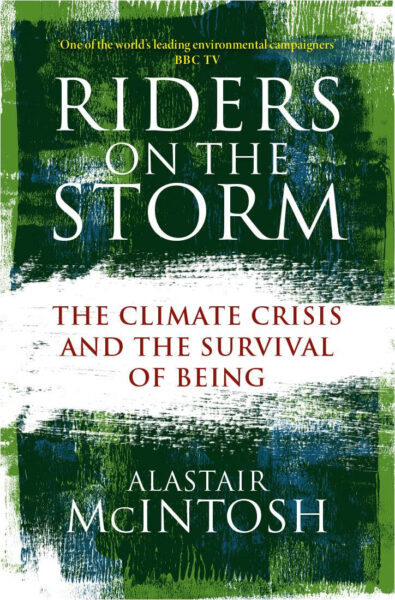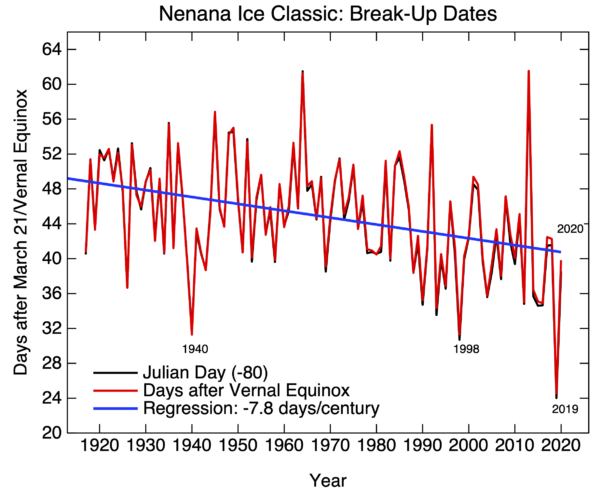The title of this post might seem like a truism, but for about a decade some people have claimed the opposite, and many people have spent much time and effort trying to understand why. Much of that effort was wasted.
[Read more…] about Cold extremes do in fact decrease under global warmingArctic and Antarctic
Not just another dot on the graph? Part II
Annual updates to the model-observation comparisons for 2023 are now complete. The comparisons encompass surface air temperatures, mid-troposphere temperatures (global and tropical, and ‘corrected’), sea surface temperatures, and stratospheric temperatures. In almost every case, the addition of the 2023 numbers was in line with the long term expectation from the models.
[Read more…] about Not just another dot on the graph? Part IINot just another dot on the graph?
As the climate monitoring groups add an additional dot to their graphs this week, there is some disquiet among people paying attention about just how extraordinary 2023 really was.
[Read more…] about Not just another dot on the graph?Old habits
Media awareness about global warming and climate change has grown fairly steadily since 2004. My impression is that journalists today tend to possess a higher climate literacy than before. This increasing awareness and improved knowledge is encouraging, but there are also some common interpretations which could be more nuanced. Here are two examples, polar amplification and extreme rainfall.
[Read more…] about Old habitsUnforced variations: Sep 2023
This month’s open thread on climate science topics. It’s been a warm summer, dontcha know? Expect ERA5, the satellite data and then the surface data products to confirm this in the next week or so. Sea ice minimum in the Arctic will also occur soon, as will a record low maximum in the Antarctic. El Niño still building in the tropical Pacific. Interesting times…
Why is future sea level rise still so uncertain?
Three new papers in the last couple of weeks have each made separate claims about whether sea level rise from the loss of ice in West Antarctica is more or less than you might have thought last month and with more or less certainty. Each of these papers make good points, but anyone looking for coherent picture to emerge from all this work will be disappointed. To understand why, you need to know why sea level rise is such a hard problem in the first place, and appreciate how far we’ve come, but also how far we need to go.

Don’t climate bet against the house
Decades ago (it seems) when perhaps it was still possible to have good faith disagreements about the attribution of current climate trends, James Annan wrote a post here summarizing the thinking and practice of Climate Betting. That led to spate of wagers on continued global warming (a summary of his bets through 2005 and attempts to set up others is here).
There were earlier bets, the most well known perhaps was the one for $100 between Hugh Ellsaesser and Jim Hansen in 1989 on whether there would be a new temperature record within three years. There was (1990), and Ellsaesser paid up in January 1991 (Kerr, 1991). But these more recent bets were more extensive.
[Read more…] about Don’t climate bet against the houseReferences
- R.A. Kerr, "Global Temperature Hits Record Again", Science, vol. 251, pp. 274-274, 1991. http://dx.doi.org/10.1126/science.251.4991.274
2020 Hindsight
Yesterday was the day that NASA, NOAA, the Hadley Centre and Berkeley Earth delivered their final assessments for temperatures in Dec 2020, and thus their annual summaries. The headline results have received a fair bit of attention in the media (NYT, WaPo, BBC, The Guardian etc.) and the conclusion that 2020 was pretty much tied with 2016 for the warmest year in the instrumental record is robust.
[Read more…] about 2020 HindsightDenial and Alarmism in the Near-Term Extinction and Collapse Debate
Guest article by Alastair McIntosh, honorary professor in the College of Social Sciences at the University of Glasgow in Scotland. This is an excerpt from his new book, Riders on the Storm: The Climate Crisis and the Survival of Being
 Mostly, we only know what we think we know about climate science because of the climate science. I have had many run-ins with denialists, contrarians or climate change dismissives as they are variously called. Over the past two years especially, concern has also moved to the other end of the spectrum, to alarmism. Both ends, while the latter has been more thinly tapered, can represent forms of denial. In this abridged adaptation I will start with denialism, but round on the more recent friendly fire on science that has emerged in alarmism.
Mostly, we only know what we think we know about climate science because of the climate science. I have had many run-ins with denialists, contrarians or climate change dismissives as they are variously called. Over the past two years especially, concern has also moved to the other end of the spectrum, to alarmism. Both ends, while the latter has been more thinly tapered, can represent forms of denial. In this abridged adaptation I will start with denialism, but round on the more recent friendly fire on science that has emerged in alarmism.
Nenana Ice Classic 2020
Readers may recall my interest in phenological indicators of climate change, and ones on which $300K rest are a particular favorite. The Nenana Ice Classic is an annual tradition since 1917, and provides a interesting glimpse into climate change in Alaska.
This year’s break-up of ice has just happened (unofficially, Apr 27, 12:56pm AKST), and, like in years past, it’s time to assess what the trends are. Last year was a record early break-up (on April 14th), and while this year was not as warm, it is still earlier than the linear trend (of ~8 days per century) would have predicted, and was still in the top 20 earliest break-ups.

A little side bet I have going is whether any of the contrarians mention this. They were all very excited in 2013 when the record for the latest break-up was set, but unsurprisingly not at all interested in any subsequent years (with one exception in 2018). This year, they could try something like ‘it’s cooling because the break up was two weeks later than last year (a record hot year)’, but that would be lame, even by their standards.